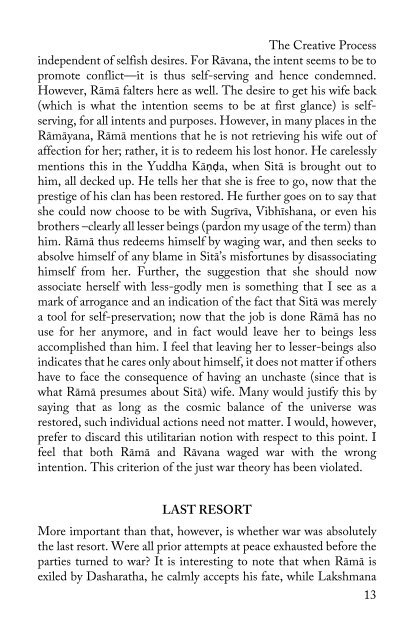The Creative Process: The Arts of War (Spring 2017)
The Creative Process is The Mumbai Art Collective's flagship magazine.
The Creative Process is The Mumbai Art Collective's flagship magazine.
You also want an ePaper? Increase the reach of your titles
YUMPU automatically turns print PDFs into web optimized ePapers that Google loves.
<strong>The</strong> <strong>Creative</strong> <strong>Process</strong><br />
independent <strong>of</strong> selfish desires. For Rāvana, the intent seems to be to<br />
promote conflict—it is thus self-serving and hence condemned.<br />
However, Rāmā falters here as well. <strong>The</strong> desire to get his wife back<br />
(which is what the intention seems to be at first glance) is selfserving,<br />
for all intents and purposes. However, in many places in the<br />
Rāmāyana, Rāmā mentions that he is not retrieving his wife out <strong>of</strong><br />
affection for her; rather, it is to redeem his lost honor. He carelessly<br />
mentions this in the Yuddha Kāṇḍa, when Sitā is brought out to<br />
him, all decked up. He tells her that she is free to go, now that the<br />
prestige <strong>of</strong> his clan has been restored. He further goes on to say that<br />
she could now choose to be with Sugrīva, Vibhīshana, or even his<br />
brothers –clearly all lesser beings (pardon my usage <strong>of</strong> the term) than<br />
him. Rāmā thus redeems himself by waging war, and then seeks to<br />
absolve himself <strong>of</strong> any blame in Sitā’s misfortunes by disassociating<br />
himself from her. Further, the suggestion that she should now<br />
associate herself with less-godly men is something that I see as a<br />
mark <strong>of</strong> arrogance and an indication <strong>of</strong> the fact that Sitā was merely<br />
a tool for self-preservation; now that the job is done Rāmā has no<br />
use for her anymore, and in fact would leave her to beings less<br />
accomplished than him. I feel that leaving her to lesser-beings also<br />
indicates that he cares only about himself, it does not matter if others<br />
have to face the consequence <strong>of</strong> having an unchaste (since that is<br />
what Rāmā presumes about Sitā) wife. Many would justify this by<br />
saying that as long as the cosmic balance <strong>of</strong> the universe was<br />
restored, such individual actions need not matter. I would, however,<br />
prefer to discard this utilitarian notion with respect to this point. I<br />
feel that both Rāmā and Rāvana waged war with the wrong<br />
intention. This criterion <strong>of</strong> the just war theory has been violated.<br />
LAST RESORT<br />
More important than that, however, is whether war was absolutely<br />
the last resort. Were all prior attempts at peace exhausted before the<br />
parties turned to war? It is interesting to note that when Rāmā is<br />
exiled by Dasharatha, he calmly accepts his fate, while Lakshmana<br />
13



